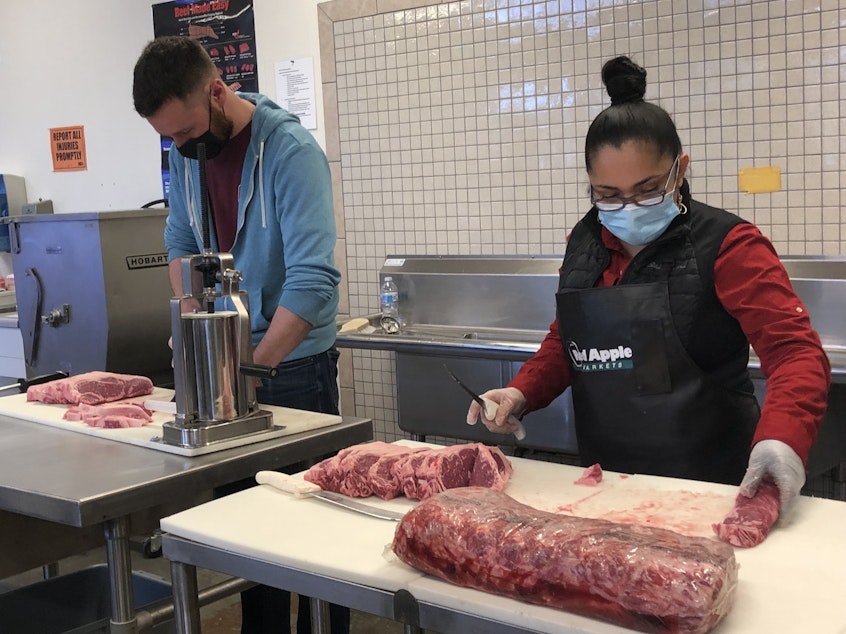Seattle needs fishmongers. Could this be the solution?

Apprenticeships have long helped construction workers learn advanced skills — and earn higher pay. Now unionized grocery workers in Western Washington are following that example. They’re teaming up with employers like Albertsons and Kroger to create more advanced training and career paths.
Ana Cuevas now works as a meat-cutter at the PCC grocery store in Redmond. She said a few years ago she was working three jobs, when her supervisor recommended her for an apprenticeship program to learn those skills. Cuevas says she was intimidated at first about lifting heavy loads and being accepted by senior co-workers.
But “I worked hard for them, and they really respect me now,” she said.
She likes the work and said it’s led to higher pay. Graduates of the program can make $24.70 an hour as “journey” meat cutters.
“I remember myself living in a small mobile home with my mom and my two sisters. Now my sisters have kids. And as soon as I finished my program from this school, I was qualified to buy a house by myself,” Cuevas said. “So I’m the first member of my family to own a house, and I feel really proud.”
The Seattle Puget Sound Meat Cutters Program is an established route for grocery workers to earn college credit and become certified in that work. It’s located on the Georgetown campus of South Seattle College. Now the United Food and Commercial Workers Union Local 21 is building on that program to create apprenticeships for fishmongers, bakers and other specialties. Officials called it a historic agreement between the union and their employers to invest in workers.
Sponsored
Evan Woods is the executive director of WeTrain, the new nonprofit created to oversee the programs.
"There have been individual programs, but never before have we had an organization and an initiative dedicated to the entire grocery industry, to really uplifting all grocery store workers," Woods said.
Faye Guenther is president of the United Food and Commercial Workers Local 21. She said the “fishmonger” course will be unique in the nation. She recently spoke to a grocery store manager who said those skills are sorely needed.
“He had like 23 people turn over in the previous six months. And so people feel like, ‘I don’t know how to use this knife, I don’t know how to fillet a fish!’”
Guenther said her union along with employers, King County and Washington State have contributed about two million dollars in seed money to start building the programs. Apprentices pay tuition and earn college credit, but some employers cover their workers’ costs. Starting in 2022 employers will also pay into a trust, which will provide an ongoing funding source.
Sponsored
UFCW 21 represents about 29,000 grocery workers with 35 different employers in Western Washington. Woods said these programs will help lead to higher wages in a state workforce that is 53% female, 32% people of color, and 17% immigrant and refugee. He said workers are battling low morale, high turnover, stagnant wages and staffing algorithms and self-checkout pressures that are hurting customer service.
“Through training and education, WeTrain will improve customer service, build and strengthen career pathways, recruit and retain workers, boost employee morale, expand equity in the grocery store, and keep our stores clean, healthy and safe," Guenther said.




